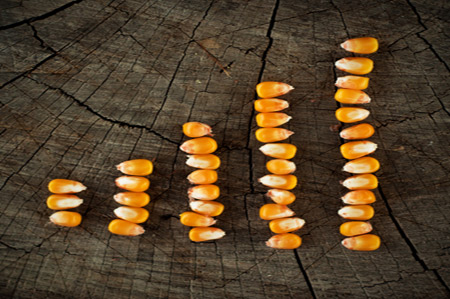 (Agrimoney) – Hedge funds turned more positive on agricultural commodities for the first time in nine weeks, spurred by lower hopes for the US corn yield, although on coffee, they turned their most bearish in nearly two years.
(Agrimoney) – Hedge funds turned more positive on agricultural commodities for the first time in nine weeks, spurred by lower hopes for the US corn yield, although on coffee, they turned their most bearish in nearly two years.
Managed money, a proxy for speculators, lifted its net long position in futures and options in the top 13 US-traded agricultural commodities, from cotton to cattle, by 19,402 contracts in the week to last Tuesday, analysis of data from the Commodity Futures Trading Commission regulator shows.
The increase in the net long – the extent to which long bets, which profit when values rise, exceed short holdings, which benefit when prices fall – was the first since July, and ended the longest run of selling down in more than a year.
And the improved bullishness was led by positioning in grains, after the US Department of Agriculture on September 11 cut its forecast for the domestic corn yield by 1.3 bushels per acre to 167.5 bushels per acre, a bigger downgrade than investors had forecast.
Grain buying
In corn itself, hedge funds raised their net long position by more than 20,000 contracts in Chicago, a process spurred in particular by the closure of short bets, which had proved largely profitable for investors.
Managed money also cut its net short in Chicago soft red winter wheat futures and options by more than 8,000 contracts, representing mainly fresh long bets, while trimming their net short in Kansas City hard red winter wheat too.The gross short in corn fell by more than 15,000 lots to a little over 160,000 contracts.
The positioning on corn and wheat more than offset a more bullish move by speculators on soybeans, after the USDA surprised the market by lifting its forecast for the domestic yield.
Indeed, the in the big six grain and oilseed contracts, managed money turned more bullish for the first time since July, restoring a small net long position, after falling in the previous week to a net short of 8,743 lots.
Bears attack cattle
The improved sentiment trumped an increase in downbeat positioning on soft commodities and livestock, including a cut in the net long in Chicago live cattle futures and options below 10,000 contracts for the first time since April 2013.
Beef prices, as measured by the wholesale “cutout” value, fell nearly $10 a hundredweight last week to the lowest since May.Cattle prices have been undermined by ideas of buoyant production, at a time when market power has shifted to meat packers, as Agrimoney.com reported last week, allowing them to pass on weakness in beef values.
Evidence of the weakened margins for cattle feeders was evident in USDA data late on Friday showing that feedlots last month took in 1.63m head of cattle for fattening, down 5.0% year on year, and the lowest figure since government records began in 1996.
By contrast, hedge funds in the latest week raised their net long in Chicago lean hogs to a three-month high, helped by a firmer pork market, which is being underpinned by a switch by beef customers to lower-priced meats.
Sugar vs coffee
Among New York-traded soft commodities, hedge funds maintained their shift bullish on raw sugar futures and options, taking their net long to a 14-month high of 5,563 contracts.
However, on arabica coffee beans, managed money expanded its net short nearly to 24,000 contracts, a 22-month high, lacking the weather threats to protect it from weakness in the real, which on Friday hit R$3.9616 to $1, the weakest in 13 years.The sugar market has been supported by concerns over excessive rains slowing Brazilian cane harvesting, while a weak monsoon has sapped expectations for output in India – although news on Friday that India was moving to force mills to export up to 4m tonnes of the sweetener.
A soft real undermines the value, in dollar terms, of assets in which Brazil is a major player.
The wetness reaching southern Brazil – while a setback for sugar cane harvesters, and indeed for coffee growers trying to dry the last of this year’s harvest – is boosting the prospects for the arabica-tree flowering ahead of the 2016 crop.




